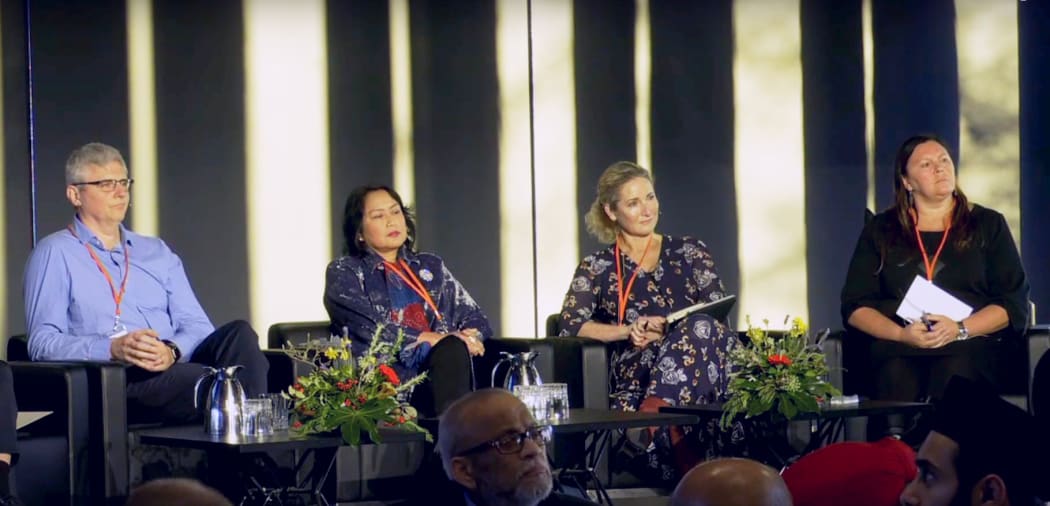A group representing our major news media have agreed a set of principles for reporting terrorism and “national security events." It's a response to fears extremists could use the media for their own ends and that disclosures during an emergency could put lives in danger - especially when information is unverified. But does giving ground on this mean the media surrender their right to publish in the public interest?

Senior editors from RNZ, Stuff and NZME take questions at He Whenua Taurikura - along with AUT senior lecturer Khairiah Rahman. Photo: screenshot / He Whenua Taurikura livestream
Last month the Department of Prime Minister and Cabinet organised He Whenua Taurikura - a counter terrorism hui held in Christchurch.
It was recommended by the Royal Commission of Inquiry into the 15 March terrorist attack and the idea was to explore ways of preventing similar attacks and combating extremism.
It also addressed the roles and responsibilities of the news media.
Stuff’s editor Sinead Boucher told the hui our news media have a social conscience that social media don't - and had in the past withheld information to keep people safe.
Miriyana Alexander - the head of premium content at the New Zealand Herald reminded the hui all mainstream news media agreed on protocols for reporting the trial of Brenton Tarrant last year - to ensure he could not grandstand or promote his beliefs.
At the time some free speech and media freedom advocates were alarmed by that.
Miriyana Alexander is also the current chair of the Media Freedom Committee, the body which represents the mutual interests of our news media.
At the He Whenua Taurikura hui she revealed that the Media Freedom Committee had been meeting twice a year with the Department of the Prime Minister and Cabinet with terror attacks or crises in future in mind.
"Some protocols have been drafted," Alexander said.
"I’m not aware of this happening in any other jurisdiction and it’s evidence of the media’s desire to be a responsible member of our community," she said.
Principles for reporting terrorism events and national security emergencies have been agreed - and published.
The Terrorist and National Security Event Media Protocols outline what media, government and police are expected to do during such an emergency within New Zealand - or one overseas involving New Zealanders.
The document lists 16 “working principles” and says the overall goal is “to make every effort to minimise risks to life and property while also informing the public to the maximum extent possible”.
All parties recognise the domestic news media and social media are “the most effective communication channels for government and emergency services to convey information to the New Zealand public - and that “the public expects open, timely and accurate information alongside responsible reporting by media”.
For its part, the news media agree to act “responsibly and co-operatively with authorities” throughout any given event.
Does that mean surrendering freedom to publish to the authorities during emergencies - and even after?
The principles clearly state “editorial control will remain with news media editors” - with one exception: the Emergency Powers Act 1987 allows for the preservation of anonymity for “operational personnel, or equipment and techniques lawfully used to deal with an emergency”.
So far so straightforward.
But another principle is this:
“It is understood that terrorists or their accomplices may use social media to livestream their actions, monitor media and social media to gain information about tactical responses - and communicate with the media via social media during an ongoing event.”
With that in mind, the media have agreed to “exercise appropriate editorial judgement” about publishing any unverified information from such sources - as well as “terrorist symbols, signs and propaganda”.
In other words editors can publish that sort of stuff, but they would have to be able to justify it to the MFC - as well as authorities.
The working principles also say New Zealand media will have “a heightened awareness of responsibilities to New Zealand audiences” - and must recognise “precise language is important in any commentary in order not to frame a specific section of the community as a security risk”.
The protocols also cover what should happen if a news media organisation is contacted by a terrorist or terrorist organisation.
The MFC has agreed authorities will be notified if that happens.
The government or police cannot force the media not to publish anything they learn from a terrorist or terror group, but ...
“Any request for withholding the publication or broadcast of such information will be most seriously considered by the relevant editor who will make the final decision.”
What about the airing of information of genuine public interest?
Principle 9 says the Official Information Act applies in such cases.
“Information of interest to the public should be made available via the news media unless there are compelling security or public safety reasons not to do so.”
It adds that “no unnecessary delays will be imposed” on that - and that decision-makers will be made available to the media as well.
Finally, after any given terrorist event or security emergency, the protocols also oblige authorities and the Media Freedom Committee to review it all - and how communication between the various parties can be improved.
It’s hard to say what difference this will mean if - or when - there’s another act of terrorism here - or one targeting New Zealanders somewhere else.
Nothing the media did or said on or after 15 March would have been in breach of these principles, with the possible exception of two instances of the airing of images from the terrorists’ live stream on 15 March 2019 - one online (for a short time) and one TV news broadcast.
But they will give media something to point to if authorities in future over-reach by trying to shut down coverage that is responsible and in the public interest.

